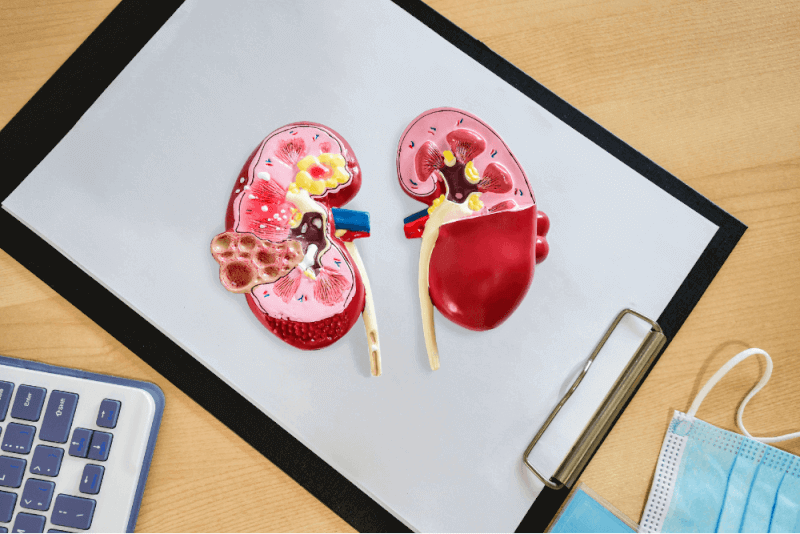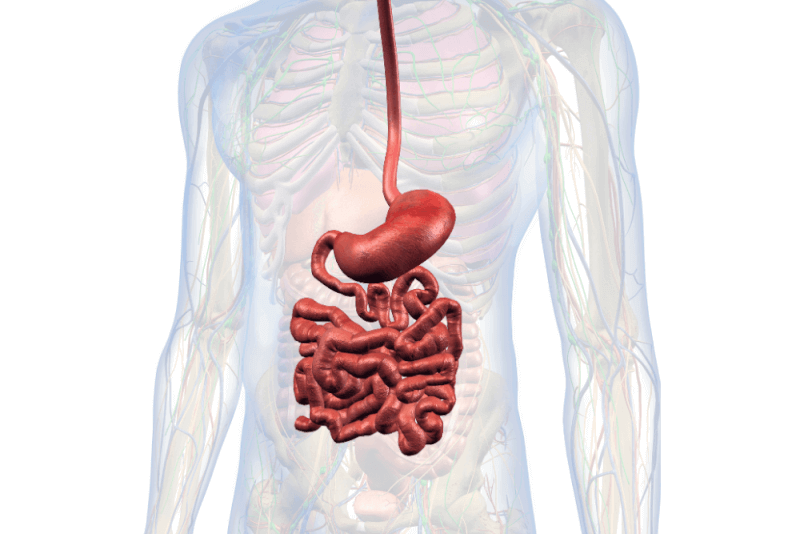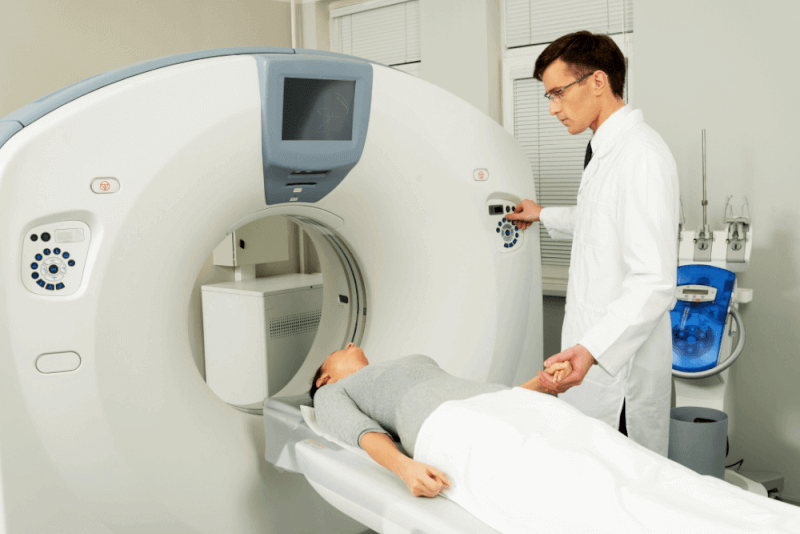30 Second Summary
- Kidney transplantation is a surgical procedure performed on patients whose kidneys are damaged or fail to function.
- Kidney transplantation can be performed from both living donors and cadavers.
- Kidney transplantation can significantly improve patients' quality of life and life expectancy.
- Kidney transplantation carries some risks because it is a surgical procedure, but these risks are usually less than the benefits of the transplant.
Kidney transplant operations are one of the treatment methods applied to patients with irreversible kidney failure whose kidneys have been damaged due to various reasons and therefore cannot fulfill their functions.
Failure of kidney function causes the blood not to be filtered. This leads to the accumulation of toxins, urea, keratin and water in the blood. The accumulation of these toxic substances causes symptoms such as shortness of breath, hypertension, vomiting, abdominal pain, weakness, loss of appetite and fatigue.
Failure of the kidneys to function and prolonged kidney failure can lead to many serious health problems, including fatal consequences. For this reason, kidney failure needs to be treated as soon as possible. Dialysis is one of the main treatment options for patients with kidney failure. However, kidney transplantation is one of the most important treatment options frequently used in kidney diseases and improves the quality of life of patients.
In which cases is kidney transplantation performed?
Kidney transplantation is a surgical procedure for people whose kidneys have completely failed. Patients who have reached this stage are already on dialysis treatment. However, only 10% of the blood can be filtered by dialysis. However, if the kidney transplant is successful, it is possible to filter all the blood.
How is a kidney transplant performed?
Kidney transplantation can be performed from both living donors and cadavers. Despite efforts all over the world, organ transplants from brain-dead people have not reached the desired level. For this reason, living donors are used more often, especially when it comes to kidney transplantation.
If the kidney is to be removed from a cadaver, then the operation must be planned quickly and urgently and the patient must be prepared for surgery as soon as possible. Because the kidney must be transplanted as soon as the donor is brain dead. Delay in transplantation causes the kidney to become damaged or even unusable.
If the donor is healthy, the surgery will take place in a planned manner. In this case, however, antibody tests must first be performed to determine whether the donor and recipient are compatible. In case of compliance, the date of surgery is set.
Kidney transplant operations are performed under general anesthesia. If a kidney transplant is to be performed from a healthy person, laparoscopy is usually used to remove the kidney. In this way, the healing process of the healthy individual will take place in a shorter time as less tissue will be damaged.
An incision is made in the abdomen to transplant the kidney. The diseased kidney is removed and replaced with a healthy kidney. All blood vessels and arteries are then ligated. After the kidney is successfully implanted into the body, blood flow is ensured to start without any problems. The ureter of the transplanted kidney is then connected to the bladder so that the patient can urinate. If the unhealthy kidney does not cause complications such as blood pressure or infection in the patient, it is preferable to leave it in the body. The patient's incision in the abdomen is then closed.
What are the conditions for a kidney transplant?
Both the donor and the recipient must meet certain conditions in order to receive a kidney transplant. These requirements for kidney transplantation are important for the treatment to be successful, for the healthy donor not to be harmed and for ethical rules to be protected.
Conditions at the buyer
Kidney transplantation can be performed in the majority of patients with kidney failure. However, kidney transplantation is not performed in the presence of kidney failure as well as chronic diseases that can cause damage to the healthy kidney in a short period of time.
Conditions at the donor
The conditions that must be met for a living donor in our country include the following:
- To be over 18 years old
- Mental well-being
- Patient 4. being a relative up to degree
- In order for unrelated people to become kidney donors, they must apply to the Ministry of Health and obtain the approval of the ethics committee.
- Be under 65 years of age. However, this limit can be raised if the donor's general health condition is favorable for being a donor.
- The clinical examinations have been concluded to be healthy
- Ensuring tissue compatibility within the specified criteria
What are the risks of kidney transplantation?
Since kidney transplantation is a surgical procedure, there are some risks for both the donor and the recipient. The risks are much lower for the donor.
Risks at the buyer
Kidney transplant operations carry some risks for the recipients. However, kidney transplantation is the most appropriate method for the treatment of patients with renal failure because the complete loss of kidney function carries a life-threatening risk and the risk of death is much higher in patients on dialysis treatment than in kidney transplantation.
The worst complication of kidney transplant surgery is the risk of death. This risk is 2 or 3 per thousand in recipients. It is also possible that the newly transplanted kidney does not work at all or that the new kidney loses its function after a while. To reduce this risk, kidney transplantation is performed from living donors.
Another problem that buyers may face is psychological. After the operation, recipients may feel indebted or guilty towards the donor. However, this situation can be easily resolved with family solidarity and psychological help.
The risks that the recipient faces during and after kidney transplant operations are categorized under 3 main headings. These are surgical risks, medical risks and immunization risks. Other complications that recipients may face include the following:
- The fact that kidney patients have to use blood thinners due to coronary vascular problems increases the risk of bleeding and hematoma both during and after surgery.
- Because of the immunosuppressive drugs used to prevent the new kidney from being damaged by the immune system, scar tissue infections are more common in recipients.
- If patients have diabetes or hypertension in addition to kidney failure, it is expected that vascular structures will be impaired. Disruption of the internal vascular structure may cause clot formation in the suture line.
- Vascular blockages can occur due to clots. Blockages in the arteries or veins can lead to the loss of the organ.
- Steroids and other drugs used in medical symptoms after kidney transplantation have side effects on the central nervous and digestive systems. These side effects can lead to blockages in small blood vessels due to clots.
- Another symptom that can be seen in recipients after surgery is infection. Microbial diseases, especially urinary tract infections, are frequently encountered.
- Drugs used in the treatment of infections can burden the kidneys and cause their function to deteriorate.
- Failure to fully treat the infection can lead to rejection of the kidney.
- Some recipients experience tissue rejection despite all compatibility tests being positive.
- The immunosuppressive drugs used can cause the hormone system to become out of balance and lead to diseases such as diabetes.
Risks at the donor
The important thing in kidney transplantation is to preserve the health of the donor. For this reason, detailed examinations of the donor's health status are carried out before transplantation. The results of these examinations are also evaluated by a panel of physicians. As a result of this evaluation, if the donor's health condition is favorable for transplantation, the transplantation process takes place. Transplantation therefore has very low risks for donors.
However, since kidney transplantation is a surgical procedure, there are some risks. For this reason, no physician can guarantee that the operation will be 100% successful. The risk of donor death in kidney transplant operations is 1 in 3,000. In addition, 5% of patients experience infection at the incision sites and 4% have urinary tract infections. These rates are the same as in appendicitis or gall bladder surgery.
In addition, it is normal for donors to feel pain for a few days after the operation. In 4%, these pains may be mild for the first year. Donors are discharged 5 days after the operation and it takes 2 months for them to fully return to their normal lives.
Who cannot have a kidney transplant?
The number of patients who cannot receive a kidney transplant is extremely limited. However, some patients' health conditions prevent kidney transplantation from being performed immediately. These situations are listed below:
- Patients with active infection can undergo the procedure after the infection is treated.
- In patients with tumors, the type of tumor determines whether a transplant will be performed. Tumors that cannot prevent transplantation must be treated and it must be determined whether they will recur.
- If the tumor metastasizes, kidney transplantation is not possible.
- The advanced age of the patient is considered to be a relative condition. In this evaluation, not only the patient's age but also the general health status is taken into consideration.
- There is no harm in kidney transplantation for hepatitis B patients. Because these patients can continue to take their medication after transplantation.
- Hepatitis C patients do not undergo kidney transplant surgery. Because the drugs used in the treatment of hepatitis C cause damage to the kidney. For this reason, hepatitis C must first be treated and then the kidney transplant operation must be performed.
- One of the health problems caused by diabetes is kidney failure. However, diabetes is not one of the reasons preventing kidney transplantation. For this reason, people with diabetes can also receive a kidney transplant.
Who cannot give a kidney?
People who want to donate a kidney must be in very good health. For this reason, donors must meet many conditions that are not present in recipients. While this makes organ donation difficult, it is extremely important in terms of protecting the health of healthy individuals. The characteristics of people who are not eligible to be a kidney donor include the following:
- People with HIV infection
- People with a history of pulmonary embolism or recurrent thrombosis
- Proteinuria
- Low GFR
- People with serious medical illness
- People with psychiatric illness
- People with chronic kidney disease
- People with bilateral or recurrent kidney stones
- People with morbid obesity
- Diabetes patients
- People with hypertension or taking hypertension medication
Recovery after kidney transplantation
Patients are asked to stay in hospital for the first week after the kidney transplant. The aim of this is to intervene as soon as possible in case of any complications. In this way, the health of both the patient and the organ is more easily and effectively protected.
After a kidney transplant, patients may start urinating immediately. However, it is important to remember that it takes some time for the blood to be filtered in the kidney. For this reason, patients may need to go back on dialysis for a few hours after surgery.
Patients are asked to rest for 8 weeks after the transplant operation. Afterwards, patients can return to their normal lives. In the following period, patients should go to regular controls without interruption.
Many different tests are frequently performed on the patient after recovery. For this reason, patients may need to reside close to the hospital during this period.
Life after kidney transplant
50% of living donor kidney transplant patients live their first 25 years without any problems. In cadaveric kidney transplant patients, this period is 10 years. After kidney transplantation, 80% of kidney transplant recipients can return to their normal jobs and participate in active working life.
In order for patients to continue their lives in a healthy way after kidney transplantation, they need to take the medications they need to use throughout their lives regularly. It is also important that they go for regular check-ups and that their health status is constantly monitored.
In addition, since transplant patients use immunosuppressive drugs after surgery, the risk of infection increases. Patients should avoid contact with sick people and stay away from these environments to avoid infection.
Finally, the medications used after kidney transplantation cause weight gain and elevated blood pressure and sugar levels. In order to prevent this situation, it is important for patients to exercise regularly and eat a healthy diet.
What is "kidney rejection" after kidney transplantation?
In kidney transplants, the introduction of a foreign tissue into the body causes the immune system to react to this tissue. For this reason, after organ transplants, patients need to take immunosuppressive drugs for the rest of their lives. However, some patients use these drugs, but their immune system reacts to the new kidney. This risk is particularly high in the immediate post-transplant period. Although the risk of kidney rejection decreases over time, it persists throughout patients' lives.
Life expectancy of kidney transplant patients
After kidney transplantation, patients' quality of life and life expectancy increase compared to dialysis patients. In addition, a long life awaits patients after kidney transplantation, as multiple kidney transplants are possible and transplant patients can also benefit from dialysis treatment in case of any problems.












